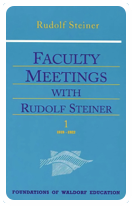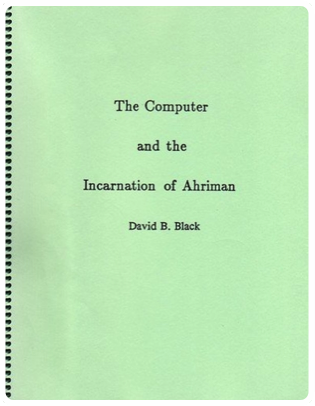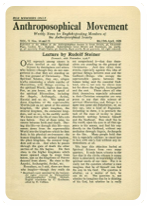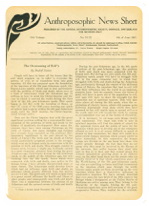Waldorf and the Media
The Lure and Appeal of a Low-Tech Steiner-Waldorf Education

Steiner-Waldorf schools, with their emphasis on outdoor play, wooden toys, hands-on learning and storytelling, seem to harken back to a simpler, more gentle, perhaps more human world, one which the rest of us appear to have left behind as we embrace our engulfing digital revolution.
This organic world view lures eager parents in droves, as a more hopeful, down-to-earth, robust and healthy alternative to the pale glow of technological dependency. Promotional material about Steiner-Waldorf schools, such as videos or photos, are very seductive to such parents.
Positive coverage in the media reinforces this notion. Every few months it seems, an article is being published somewhere in the world, about how different and beneficial Steiner-Waldorf schools are:
“Calculators and computers are banned until children are older. The Steiner philosophy dictates that screen images hinder the development of thought and imagination, although the school is free to use computers and calculators in the upper school.”
Who was Rudolf Steiner and What Were his Revolutionary Teaching Ideas?
[Sep 2011, Richard Garner]
“The school’s chief teaching tools are anything but high-tech: pens and paper, knitting needles and, occasionally, mud. Not a computer to be found. No screens at all. They are not allowed in the classroom, and the school even frowns on their use at home.
Schools nationwide have rushed to supply their classrooms with computers, and many policy makers say it is foolish to do otherwise. But the contrarian point of view can be found at the epicenter of the tech economy, where some parents and educators have a message: computers and schools don’t mix.”
Silicon Valley school that doesn't compute
[Oct 2011, Matt Ritchel]
“From the iPad to Xbox your kids are plugged in, so why are some of the biggest minds in technology unplugging their kids on purpose? [...] The philosophy isn't just low tech, it's no tech: there are no computers, no batteries, nothing that beeps, it's totally unplugged. [...]
The Waldorf philosophy is to let the natural world be the playground, to explore and create and imagine; put the good stuff in, get the good stuff out.”
Waldorf Schools: Unplugged on Purpose
[Feb 2012, Karen Hepp]
“The Washington Waldorf School in Bethesda is trying its best to stay unplugged. Its teachers think technology is a distraction and overhyped. They believe children are better taught through real-world experiences in the school’s vegetable garden and woodwork shop. Educators here fear that the immediate gratification of texts and Wikipedia threatens face-to-face communication and original thinking, so they ban cellphones, laptops and tablets and require students to hand-write papers until high school.”
High-tech vs. no-tech: D.C. area schools take opposite approaches to education
[May 2012, Cecilia Kang]
“There's something undeniably wholesome about the Steiner approach. In an age when toddlers are adept at using iPhones, the idea of children building shelters in the woods is profoundly attractive to parents. Access to television is restricted – under the homeschool agreement with parents, children are not meant to watch TV before the age of eight. [...]
It's clear from talking to the pupils that they don't regard Steiner as a religious movement. And the children are confident and inquisitive.”
A different class: the expansion of Steiner schools
[May 2012, Jeevan Vasagar]
“Educators at the Waldorf School in Seattle take a lot of pride in showing off just how handy, athletic and artistic their students are. The high school students are, after all, on the last leg of their Waldorf experience – a culmination of 12 years of education almost entirely free of television, video games, computers and smartphones.
“The Waldorf philosophy is simple: Students do not benefit from using computer devices before the age of 12.”
A "No Technology" School: The Waldorf Approach
[Sep 2014, Tonya Mosley]
Even Jonathan Ive, the genius designer behind iPod, iPhone, iPad and now Apple Watch, sends his own children to a Waldorf school [Jan 2010].

It should therefore be of little surprise that Waldorf education has now received The Simpsons treatment in the season 26 finale, “Mathlete's Feat”, in May 2015. But such is the appeal of these schools that unlike other subject matters, the writers didn’t make it the object of derision. Instead, yet again, the emphasis on low-tech learning was portrayed as positive. So much so in fact that the children of the new Springfield Waldorf school won a mathletic competition against a school where each student has an iPad.
But as with many aspects of Steiner education, all is not as it seems: the reason Rudolf Steiner is so averse to technology isn't primarily out of a desire to improve children's educational and physical wellbeing in their initial schooling years. His concern is much more esoteric and mystical:
“When we build steam-engines, we provide the opportunity for the incarnation of demons. We need not believe in them if we do not want to; but then we are negatively superstitious. Positive superstition is to see spirits where there are none — negative superstition is to deny them where they are. In the steam-engine, Ahrimanic demons are actually brought to the point of physical embodiment.”
“The Relation of Man to the Hierarchies”
[26th Nov 1916]

“What exists today in the physical as an impression of the spirit-soul, exists because so many people think that way, because the spirit-soul is asleep. The human being is thus in danger of drifting into the Ahrimanic world, in which case the spirit-soul will evaporate into the cosmos. We live in a time when people face the danger of losing their souls to materialistic impulses. That is a very serious matter.”
“Faculty Meetings with Rudolf Steiner” [p115]
“Ahriman has a hand in the development of mechanics, technology, anything that seeks to take the human intellect away from people and put it into machine tools and also the machinery of government. […] If the industrial technology and materialistic science which has evolved from Renaissance times and is entirely ahrimanic by nature is allowed to spread without there being any understanding of Christ, it will bind human beings to the earth and prevent them from reaching the Jupiter stage.”
“Guardian Angels: Connecting with Our Spiritual Guides and Helpers” [p55-57]
“The exploitation of electric forces, which will assume quite different dimensions from those which they have assumed so far, will enable man to spread evil over the earth, and evil will invade the earth by coming in an immediate way out of the forces of electricity.”
“The Overcoming of Evil” [4th Nov 1917]

But who is Ahriman?
David Black, author of “The Computer and the Incarnation of Ahriman”, describes him thus:
“The name Ahriman comes from the Zoroastrian god of darkness, the being eternally opposed to the god of light, who is called Ormazd. In Rudolf Steiner’s conception, Ahriman is opposed to Lucifer (literally, light-vessel), and the two of them together are opposed by the redeeming power of the Christ. Steiner’s thought is formally similar to the one advanced by Aristotle in the Nichomachean Ethics, in which evil is pictured as having the form of mutually contradictory excessive opposites, both of which are opposed by a good which stands at the mean of the two evils. The general idea, which it is the point of this book to explain in detail, is that the world has been coming increasingly under the sway of this being Ahriman in the course of the last two millennia, with an ever-increasing pace in recent centuries, and that the computer represents the vanguard of this development.”

The highly regarded Sergei O. Prokofieff [1954-2014], co-founder of the Anthroposophical Society in Russia, wrote about the relation between computers, the internet and Ahriman in his book, “Relating to Rudolf Steiner and The mystery of the Laying of the Foundation Stone”.
He begins by quoting Steiner from his 1921 lecture, “A Picture of Earth - Evolution on the Future”:
"From the earth will arise a terrible race of beings, in character midway between the mineral and plant kingdoms, as robotic beings of extreme, intense and logical intellect. They will spread and take hold of the earth, overlaying it as with a web of terrible spiders - spiders of enormous wisdom, whose organisation does not however even reach the level of plants. These terrible spiders will interweave and intermesh with each other, imitating in their movement all that human beings have conceived with their shadowy intellect - without allowing it to be inspired by a new imagination, and all that is to come through spiritual science. All unreal human thoughts of this kind will assume the reality of being. The earth will be covered […] with terrible, mineral-plant-type spiders, which will spin very rational interconnections with each other bit with malevolent intention. And the human being […] will have to merge his being with these terrible mineral-plant spider creatures.”
“These spider creatures will be distinctly ahrimanic in character”, Prokofieff explains. “Reading these prophetic words of the spiritual scientist today, in an era of global computer and internet links, you may feel disheartened to realise how quickly this prophecy is becoming a reality on earth. It is as if Rudolf Steiner, with his spiritual gaze, was describing today’s internet from beyond the threshold, categorically warning humanity that in a not too distant future, when moon and earth reunite, this whole internet and computer-web - and in fact everything connected with the development of the artificial intellect - will suddenly come alive. And then we ‘will have to merger [our] being with these terrible mineral-plant spider creatures.’ If one considers how many, particularly young people, have become computer addicts and spend most of their time in front of the screen without sufficient will to relinquish it, then one can imagine the nature of this endlessly greater dependency on such a spider kingdom if this whole web comes to life in future. It will be well-nigh impossible to disconnect ourselves from it. The alarming picture of an insect caught in the net of a huge and ravenous spider, trying in vain to free itself, offers an appropriate picture of this human future. And it will be a very special task of white magic to free such people from their bond to these beings.”

This abject fear of computers could well explain why a Steiner school newsletter stated that it would be better to let a bully bully, as doing anything to "squash” their natural tendencies could get them addicted to video games instead.
Prokofieff goes further, and sees a clear connection between the worldwide web and evil incarnate: “according to the occult teachings of the Kabala, all Hebrew letters have a numerical equivalent. Rudolf Steiner spoke about this in detail in his cycle on the Apocalypse in relation to deciphering the name of the sun demon ‘Sorat’. On this occasion Rudolf Steiner points out that the numeric equivalent of the letter W (Hebrew waw) is the number 6. If follows that the occult meaning of ‘www’ is ‘666’, the number of the beast, of which the Apocalypse says: “Here wisdom itself speaks. Whoever has the ability to think it, let him seek the meaning of the number of the beast. It is the number of Man. And its number is six hundred and sixty-six.’ The ‘number of Man’ means that the beast, which is not of human nature, will use something derived from man himself for his attacks against humanity. In my opinion the internet and everything connected with artificial intelligence are part of this.”
He even perceives dangers in storing compressed, digital data on discs and hard drives: “we have to remember that when the cosmic intelligence overseen by Michael descended from the sun to the earth in order to become human intelligence there, it underwent a massive process of compression or contraction. This intelligence, where Ahriman does not seize hold of it in the human being, repeatedly becomes ‘naturally’ free again after death during the expansion of the ether body into the cosmos - that is, during the process which forms the polarity to its previous compression. [...]
“Particularly since 1998 (3 x 666), the ahrimanic powers serving Sorat have been working in opposition to this. Ahriman - making use of the forces of sub-nature - wants to penetrate Michaelic intelligence with his artificially created intelligence, which includes the digitisation of thought. For him this is one of the ways in which he can gain power over earthly intelligence. It began with the fixing of human thoughts through printing technology and now continues with its digitisation. ‘What does Ahriman intend to gain from Michael through print? He wants - and you can see it happening everywhere today - to conquer intelligence: this conquest of intelligence will take hold wherever conditions are favourable.’
“And Ahriman finds these favourable conditions especially in the world of the computer and digital industry.”
It’s clear from the evidence that Steiner-Waldorf schools' focus on outdoor play, wooden toys and no electronics in primary education didn't arise out of some deep pedagogical study. Rather, it stems from this movement's fear that evil would reach the children through technology in general, and computers in particular, limiting humanity’s potential, and preventing it from evolving beyond this realm.
As Archangel Uriel told us himself, a Steiner-Waldorf school is on a mission from the Seventh Realm and “has been targeted by spirit to help change the way children are being taught”.
There's no denying that spending more time outdoors and less time staring at screens is beneficial. Rudolf Steiner may have been right, but for all the wrong reasons.
Would all those journalists, tech gurus, designers and animators be comfortable promoting such an alternative education system to millions of unsuspecting parents, if they knew the facts about Rudolf Steiner's motivation? So why, when the truth is so clearly out there, do we keep pushing a fairy-tale narrative that doesn’t exist?

the head of Ahriman,
carved by Rudolf Steiner

Update [23 May 2015]: a mere two days after writing this article, The Guardian published another non-critical piece about low-tech learning, written by Amy Fleming, featuring Waldorf education as the sole example: “Steiner Waldorf schools, which exclude screen time before the age of 12 in favour of physical activity, art and experiential learning, are particularly popular with Silicon Valley executives and their UK counterparts.”
Screen time v play time: what tech leaders won't let their own kids do
Update [11 June 2015]: Kentaro Toyama wrote an article for The Atlantic about the advantages and disadvantages of technology in the classroom, and casually mentioned in passing that “Silicon Valley executives send their children to Waldorf schools, where electronics are banned until the eighth grade.” This is yet another example of the media promoting the pedagogy’s agenda without conducting proper research. All it would’ve taken to make this more accurate is nine additional words: “due to a fear that demons live in electricity.”
Update [2 December 2015]: The Guardian published a highly positive piece on Steiner education by Matthew Jenkin, ignoring the real reasons why these primary schools shun technology. Instead, this journalist sings once again from the same hymn sheet: “teachers at the Waldorf School of the Peninsula prefer a more hands-on, experiential approach to learning that contrasts sharply with the rush to fill classrooms with the latest electronic devices. The pedagogy emphasises the role of imagination in learning and takes a holistic approach that integrates the intellectual, practical and creative development of pupils. [...] According to Sylvie Sklan, the [Steiner Academy Hereford] school’s chair of governors, this ethos is informed by a belief that digital devices inhibit imaginative thinking, movement, human interaction and attention spans and have no place in the education of young children.”
Tablets out, imagination in: the schools that shun technology
Update [28 December 2015]: edSurge, an independent educational resource, published an opinion piece by Kentaro Toyama, which includes the usual statement about Steiner Waldorf schools, without doing any digging, which is hardly surprising as he did the same for The Atlantic in June (see above): “The Acorn School is not alone. Many of America’s 160 or so Waldorf Schools—all independently operated private schools— also prohibit digital technology in the classroom for younger students. And, Steve Jobs famously avoided letting his children use iPads: “We limit how much technology our kids use at home.” [...] All of this is to say that well-educated parents are heeding the science about digital technology’s dubious effects on learning, and wealthier families are paying top dollar to limit how much screen time their children have.”
Update [1 January 2016]: Pro-Steiner/Waldorf articles are coming in thick and fast, riding the coat-tails of a growing anti-tech movement. This time, Naomi Schaefer Riley, writing for the Wall Street Journal, chimes in, stating that these schools “have been experiencing a resurgence in the U.S., where Waldorf has become popular with wealthy parents, including Silicon Valley types, who are attracted by the more simplified approach to learning. [...]
“In recent years Waldorf-inspired charter schools have begun popping up—there are almost 50—especially in the West. Mountain Oak is one of the older ones, launched in 1999. [...] Unlike parents at the private Waldorf schools, though, many Mountain Oak parents must be persuaded by teachers that the elimination of tablets, smartphones and even television at home is an important part of this success. [...] Teachers at Mountain Oak say they can walk into a classroom and immediately tell who has been using devices at home. “We see it in their behavioral problems, their ability to reason, their cognitive skills, even their ability to communicate with other people,” one teacher tells me. [...]
“What no one tells low-income families is this: The real digital divide is between parents who realize the harmful effects of technology on their children and try to limit them, and those who don’t.”
As expected, no mention of the real reasons behind these schools’ aversion to technology in the early years of education can be found anywhere in that article.
Update [14 June 2016]: Sarfraz Manzoor wrote an article in The Guardian, exploring the use of technology, or lack thereof, at the Iona school in Nottingham. He explains that “there is no uniform here, and no headteacher – the school is run by staff and friends – and, unlike the vast majority of primary schools these days, here the students don’t work on tablets or computers. At the front of the class is an old-fashioned blackboard. [...] Steiner schools attract parents and teachers who tend to share similar thoughts on screen time and who try to ensure their students are better able to resist the lure of technology.”
Unlike most articles, he does briefly explore some objection to these schools but gets it completely wrong when he quotes José Picardo who argues that the aversion to technology in Steiner schools is rooted in a “pseudo-intellectualism which believes the things we are familiar with are better than the things our children are familiar with”.
But it’s likely that mentioning the pedagogy’s belief in demons and Ahriman would’ve gone against the selective message of the article, which strives to show that Steiner schools have got it right, and that computers are of no benefit to early childhood education.
Could Steiner schools have a point on children, tablets and tech?

N.B.: The fear of technology isn’t new; in fact, it’s been around for as long as technology has influenced our civilisations. Possibly the oldest example is Plato’s Phaedrus (written around 2,400 years ago) within which the benefits of writing are discussed:
“Socrates tells a brief legend, critically commenting on the gift of writing from the Egyptian god Theuth to King Thamus, who was to disperse Theuth's gifts to the people of Egypt. After Theuth remarks on his discovery of writing as a remedy for the memory, Thamus responds that its true effects are likely to be the opposite; it is a remedy for reminding, not remembering, he says, with the appearance but not the reality of wisdom. Future generations will hear much without being properly taught, and will appear wise but not be so, making them difficult to get along with.”
Sound familiar?
Fearing technology is fearing progress. Writing did fundamentally change our species, but no one would argue that it wasn’t for the better, something which the above writers should be reminded of. Demons don’t lurk in electricity, nor will computers damage our children, but it will make them think differently, just like we think differently with writing than without.
















